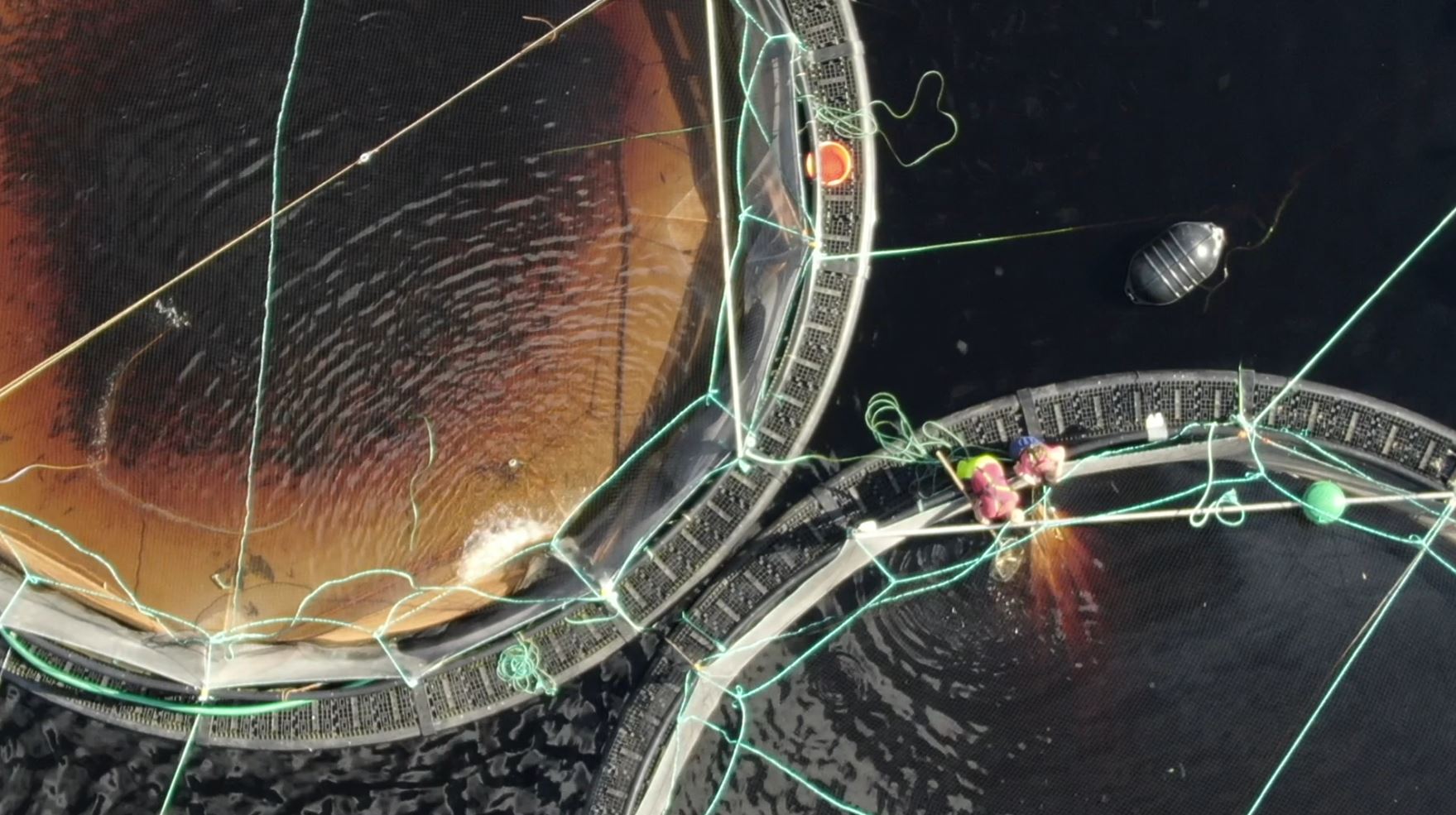An investigation has been launched into conditions at an Argyll fish farm after footage emerged of dead and dying salmon floating in cages on a freshwater loch.
Video evidence obtained by The Ferret also shows hundreds of dead fish, many with lesions, in bins at premises used by a company called Kames Fish Farming.
The footage was taken by Scottish Salmon Watch and prompted an investigation by government agencies into alleged welfare abuses.
According to Kames Fish Farming, who did not reply to our requests for a comment ahead of publication, there was no breach of the law.
Don Staniford, a veteran campaigner on fish farming and director of Scottish Salmon Watch, visited a fish farm at Loch Tralaig, just south of Oban, earlier this month, and took video of dying fish in cages at a farm run by Kames Fish Farming.
He also filmed plastic bins full of dead salmon, aka “morts”, at a site on land at Kilmelford used by Kames Fish Farming. The Kilmelford premises is close to Loch Tralaig and is the firm’s head office.
The mort videos at Kilmelford were shot on 5 September 2020. The video footage of the farm in Loch Tralaig was shot on 10 September 2020.
Staniford sent an official complaint to the Fish Health Inspectorate and the Animal and Plant Health Agency, and alleged the company had breached the Animal Health and Welfare (Scotland) Act 2006.
“I watched and was shocked at their complete disregard for dying fish belly up on the surface of their farm.”
Don staniford, Scottish salmon watch
He wrote: “I visited Kames Fish Farm in Loch Tralaig. At 8am on Thursday (10 September 2020) I witnessed farmed salmon floating dead and dying on the surface of all four cages.
“When the Kames Fish Farm workers arrived at 9.30am they spent their time filling feeding containers and lifting one of the nets to apply carcinogenic formaldehyde instead of dealing with the fish welfare problem. I watched and was shocked at their complete disregard for dying fish belly up on the surface of their farm.”
Staniford passed his footage to The Ferret and in response to our questions the Scottish government confirmed that an investigation had begun.
A Scottish Government spokesperson said that following a joint inspection by the Fish Health Inspectorate and Animal and Plant Health Agency, allegations relating to animal welfare concerns will be investigated by the latter body.
“Our 10-year farmed fish health framework aims to significantly improve the health of farmed fish in Scotland and should lead to a significant reduction in mortality,” the government spokesperson added.
“The framework commits industry, government, vets, trade associations and Scotland’s Aquaculture Innovation Centre to work together to provide a strategic, evidence-based approach to the short- and long-term improvement of fish health in Scotland.”
An Animal and Plant Health Agency spokesperson said: “We take potential breaches of animal welfare legislation very seriously and investigate all allegations. Where welfare regulations are breached, appropriate action is taken. We do not comment on individual cases.”
In May, The Ferret reported that Sepa had investigated claims that heavy use of formaldehyde at Loch Tralaig in Argyll had damaged wildlife and left the loch “stinking”. The claims were denied.
Update: Kames Fish Farming was asked to comment three times ahead of publication but did not respond.
The company sent the following press release on 25 September 2020 and this article was updated at 12.54.
Kames said: “We are aware that a report has been made to the Fish Health Inspectorate and the Animal Plant Health Agency alleging that Kames has breached the Animal Health and Welfare (Scotland) Act 2006.
“We have cooperated with the regulators to assist them in their investigation. The Marine Scotland Science and Animal and Plant Health Agency (APHA) investigation has found that we have behaved responsibly and have not breached the Animal Health Welfare (Scotland) Act 2006.
“We welcome the scrutiny and will use it as an opportunity to continue to review our practices and maintain our high standards of health and welfare. Our juvenile salmon at the site in Loch Tralaig site did suffer an outbreak of Saprolegnia and during this outbreak some fish died.
“We successfully treated the fish with the medicine formalin, under veterinary guidance and the situation is now resolved. We are committed to ensuring the highest standards of fish welfare.
“Formalin is a naturally occurring compound that breaks down in water quickly. It can be used in dilute form in fresh water smolt farming to avoid water-borne health problems. Formalin usage in smolt farming is based on scientific evidence and is regulated by the Scottish Environmental Protection Agency (SEPA).
“We have always used formalin and all other medicinal treatments within the strict regulations and terms of our CAR license issued by SEPA. Like any farmer, we take our responsibilities to maintain health and welfare of the animals in our care extremely seriously.
“In certain situations, we must treat the smolt with medicine for the treatment of a known disease. This helps ensure the wellbeing of our fish stock. Every day we work in a responsible and respectful manner in relation to our natural environment.
“We understand and fully appreciate the natural importance of Loch Tralaig and the value it has to local habitats and ecosystems. We choose to farm in the loch because of its healthy aquatic environment.
“Damaging the loch’s ecosystem through our operations would be highly unethical, but it would also make the loch’s biology increasingly difficult for our own farming operations. We have operated at this site for 35 years and no scientific evidence has suggested that we have harmed the loch by any means.”














